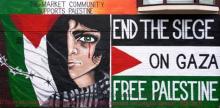
For the past 15 years, since June 2007, 2 million Palestinians have lived under a strict siege in a narrow strip along the Mediterranean Sea, 20 miles long and 3 to 5 miles wide. Israel withdrew its 7000 settlers from that strip in 2005 but then surrounded it with walls, fences, and guns. No person or goods can enter or leave the Strip without Israel’s approval. Egypt also controls the one remaining opening in the South, but it does so in coordination with Israel and according to its wishes. These restrictions have turned the Strip into an open air prison, and have led to a systematic de-development of the Gaza Strip, which today has an unemployment rate of 50% and only 4-6 hours of electricity per day. 98% of its water is undrinkable. And periodic attacks by Israel (referred to as “mowing the lawn” by Israeli generals) have left thousands of buildings destroyed and unlivable. Materials for reconstruction are carefully regulated by Israelis. Even foodstuffs are strictly controlled. Only about 100 items are allowed in (at one time even spaghetti was not on the list of permitted foods). When asked whether they were planning to starve the Gazans, an Israeli general replied, “No. We just want to put them on a strict diet.” He was not joking. A report leaked that the Israeli army had calculated the number of calories needed to keep people barely alive and used those figures to determine how many truckloads of food it would allow into the Strip.
A UN study concluded that the Gaza Strip would be “unlivable” by 2020. We are two years beyond that! How is it possible that such a situation could exist, persisting with no end in sight?! When Gazans do attempt to resist, with puny and ineffective rockets, they get bombed, smashed with devastating firepower—hundreds or thousands of tons of explosives landing for every puny rocket fired. When no rockets are fired, which happens for months on end, no one cares and the suffering continues. When Gazans attempted a peaceful “march of return” in 2018, 63 unarmed protesters were coldly and deliberately shot dead in one day by snipers who “knew where every bullet went.” The entire area is cut off from the rest of the world, with Israeli drones and jets flying overhead the whole time. It is no wonder that a recent Save the Children study found that 80% of all children in the Strip suffer from “mental health distress.”
What possible justification can there be for such cruel behavior?? Apart from being collective punishment for the violent acts of a few, such punishment makes no sense from a security standpoint. How does prohibiting exports from the Gaza Strip relate to security in any way? How is the prohibition on importing glass and building materials for reconstruction justified? Israel claims to prohibit imports of cement or steel so that such materials could not be used for building tunnels. Yet, an entire population of 2 million people still needs housing, construction, and repairs from repeated heavy bombing campaigns. Incidentally, Israel also prohibits the import of pipes greater than 1 inch in diameter, so the sewage system cannot function adequately.
Gazans constitute a significant percentage of the Palestinian population, with schools, hospitals, families and a vibrant society that is being cruelly punished, bludgeoned, and forced to live in utterly inhuman conditions with no relief in sight. Israel and Egypt are not the only ones to blame for this. The Palestinian Authority, with its enmity to Hamas, as well as the entire international community is responsible for allowing this hurtful siege.
The basic argument used is that Hamas is a nefarious terrorist organization, and that the entire population of Gaza needs to be punished for voting for Hamas and for allowing them to stay in power. Even if we accept that Hamas is a nefarious, evil organization, the truth is that the most recent election was held over 15 years ago, and most Gazans living today either did not vote for Hamas in 2006 or haven’t participated in any election ever. I may not like them or their philosophy, but regardless of what one thinks about Hamas, the siege of Gaza must be lifted.
Some brave activists have tried to physically break the siege by sailing boats, with medicine, food, and supplies to Gaza. They have been attacked, some killed, others imprisoned and had their boats seized by the Israeli Navy. On the 15th anniversary of the siege of Gaza, we need to renew our commitment and redouble our efforts to break the siege and bring an end to this inhuman misery.
By Jonathan Kuttab
friends@fosna.org, 6/16/22
